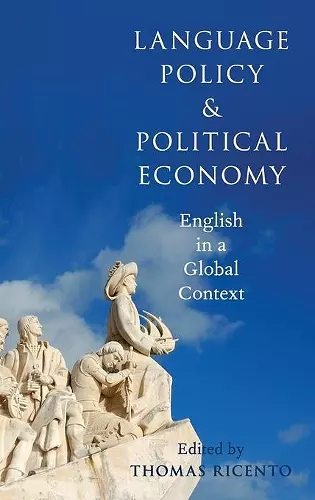Language Policy and Political Economy
English in a Global Context
Format:Hardback
Publisher:Oxford University Press Inc
Published:19th Feb '15
Currently unavailable, and unfortunately no date known when it will be back

English is the common denominator that unites the work presented in this volume; it provides a focal point to illustrate the ways in which a political economic approach can account for a range of phenomena in diverse settings in which a "global" language has attained a special status as (an often perceived) tool for socioeconomic mobility. The findings reveal the complex ways in which government leaders and policymakers, as well as communities and individuals in those communities, make decisions within a global economy about the languages that will be taught as subjects or used as media of instruction in schools. Whether or not the "Straight for English" policy that has become popular in various countries in southern Africa and elsewhere is a good or bad idea, in terms of improving school completion and literacy rates, English is often promoted as a social "good" with unquestioned instrumental value; yet access to quality English medium education in low-income countries is mostly restricted to those with sufficient economic means to pay for it. As the capitalist world-economy undergoes transformations, and assuming that translation technologies continue to improve, it is likely that the roles and relative importance that English as a global language has enjoyed over the past century will change significantly. Synchronic contextual analyses of English in various countries and regions are snapshots of a moving target with fuzzy boundaries; this is even more so the case when the object of analysis is "lingua franca English," a fluid, contextually realized "practice" that may be described in situ, which is not stable and likely never will be. The degree to which English serves effectively as a lingua franca depends on who the interlocutors are, the situation, and the extent to which interlocutors' interests and goals are mutually compatible and understood.
Tom Ricento and the stellar cast of scholars he has assembled in this book achieve something extraordinary: they construct a story that people will still have to read decades later, on an object characterized paradoxically by extremely rapid and radical change. It is an intellectual and academic 'tour de force' which focuses on mechanisms and structures rather than on phenomena and anecdotes, and so easily transcends the level of here-and-now documentation. * Jan Blommaert, Tilburg University *
In an era where language change and loss is often explained by reference to inevitable forces of 'culture' and 'globalization,' this important book brings us back home to core questions of economic power and political control. * Allan Luke, Queensland University of Technology *
Language Policy and Political Economy is both timely and important, engaging with the debates that are central to current language policy research. I don't think anyone will be able to write about 'global English' again without seriously engaging with the analyses in this book. * James Tollefson, The University of Hong Kong *
Ricento's book convinces the reader of the importance of the political economy perspective when analysing language policy in general * Christopher Houtkamp, Language Problems & Language Planning *
Language Policy and Political Economy is superbly conceived and executed, rewarding readers as both a coherent collective and in individual essays. * Vaidehi Ramanathan, Sociolinguistics *
ISBN: 9780199363391
Dimensions: 155mm x 236mm x 33mm
Weight: 567g
334 pages